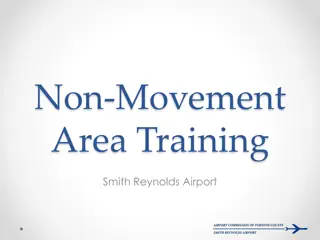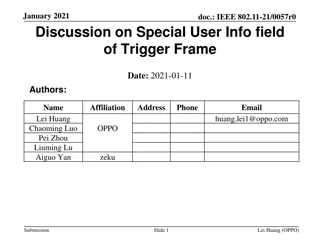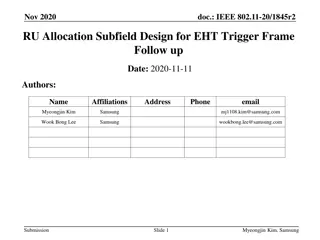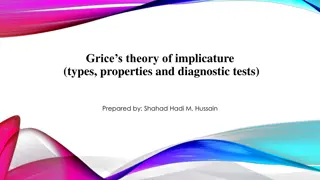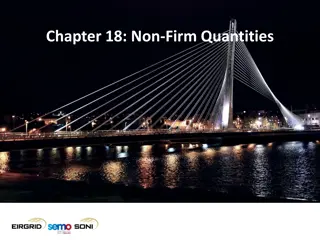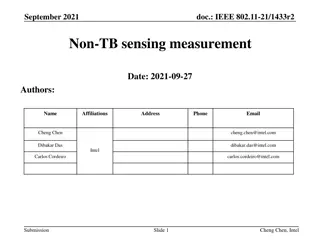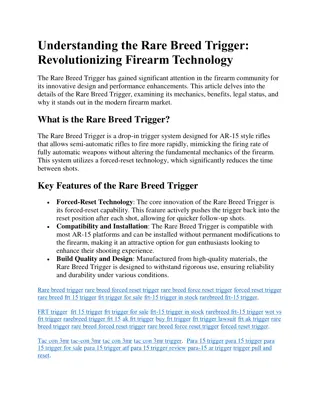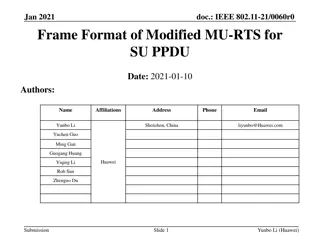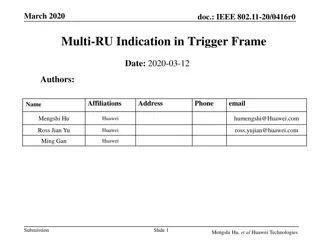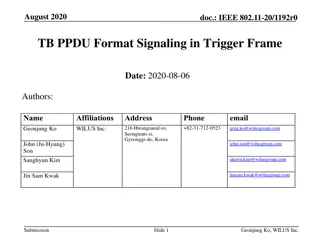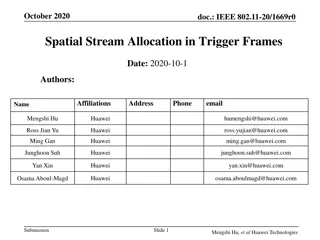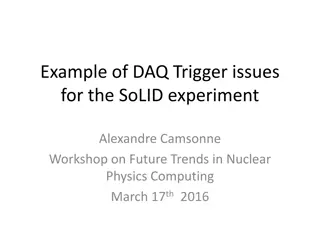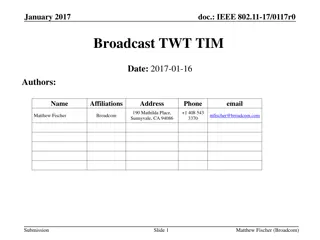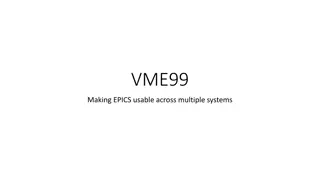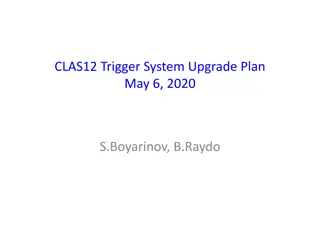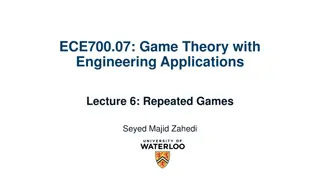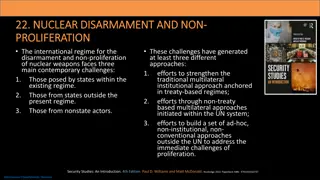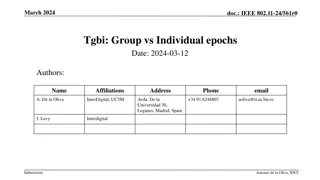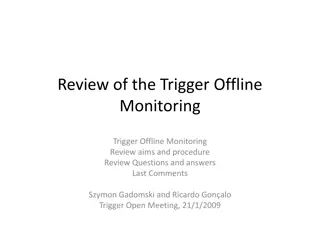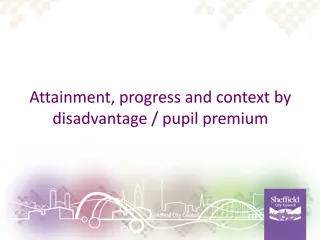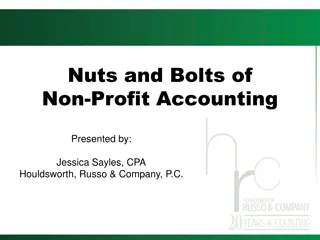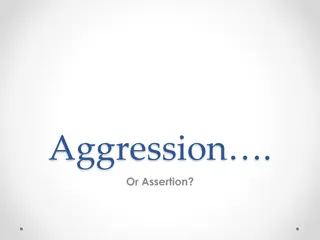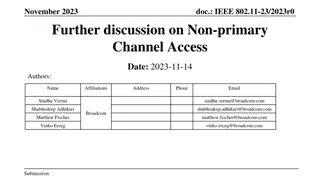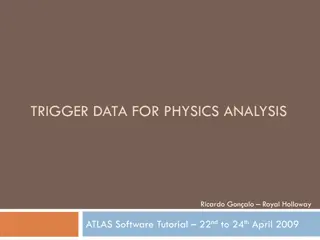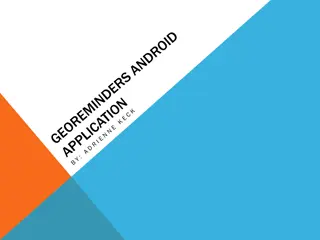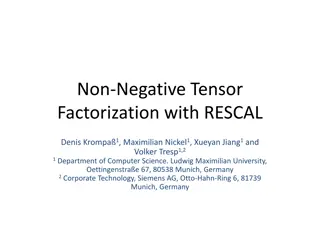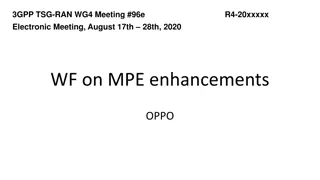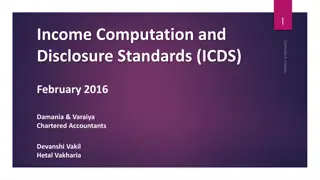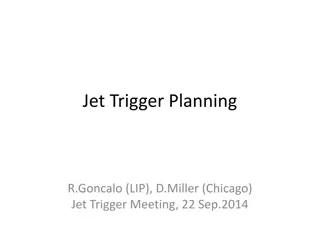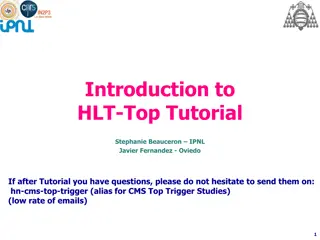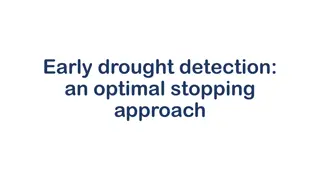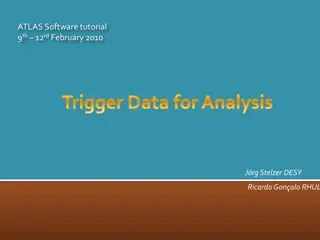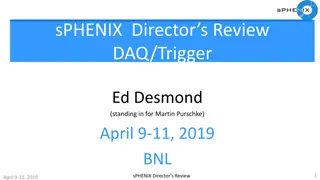Snaps and Hooks at Buckles International
Snap hooks, engineered with diverse specifications, offer multipurpose applicability and are available in various designs such as swivel snaps, bolt snaps, lobster snaps, claw clasp trigger snaps, and push trigger snaps.
0 views • 7 slides
Establishing Safety Standards in Non-Movement Areas at Smith Reynolds Airport
This guide outlines the purpose, definitions, rules, and safety measures for operating vehicles in non-movement areas at Smith Reynolds Airport. It emphasizes standardized ground movement practices to ensure the safety of airport patrons, reduce the risk of injury, and maintain a high level of safet
1 views • 12 slides
IEEE 802.11-21/0057r0: Special User Info Field Discussion
The discussion revolves around the Special User Info field introduced in enhanced Trigger frames, detailing its main usages and implications in different frame types. There are proposals to optimize the structure of the MU-RTS Trigger frame by relocating certain subfields to reduce overhead and enha
0 views • 8 slides
Designing 9-Bit RU Allocation Subfield for EHT Trigger Frame in IEEE 802.11-20
IEEE 802.11-20/1845r2 presents a proposal for enhancing the RU allocation subfield design in the EHT Trigger frame to accommodate bandwidth support up to 320MHz and multiple RU or MRU allocations for UL MU transmissions in the 11be standard. The modification addresses inconsistencies in MRU mapping
0 views • 34 slides
Understanding Non-Aqueous Solvents: Types and Classification
Inorganic non-aqueous solvents play a crucial role in chemical research and industry. This article by Dr. Princy K.G. delves into the classification of solvents based on protonicity, polarity, and aqueous vs. non-aqueous nature. It explores the types of non-aqueous solvents, such as protonic and non
1 views • 29 slides
Grice's Theory of Implicature: Types, Properties, and Diagnostic Tests
Grice's theory of implicature distinguishes between types of implicatures - conventional and conversational. Conversational implicatures are context-dependent and motivated by conversational maxims, leading to generalized and particularized implicatures. Generalized conversational implicatures are d
0 views • 18 slides
Understanding Non-Firm Quantities in Electricity Markets
Non-Firm Quantities in electricity markets involve units with non-firm access not being compensated for their non-firm capacity not getting accommodated on the system. The concept of Firm Access Quantity plays a key role in determining compensation levels for units, with differences in implementatio
0 views • 6 slides
Understanding Non-Compete Agreements: Enforceability and Requirements
Non-compete agreements are commonly used in the United States to protect businesses from competition by former employees. To be enforceable, these agreements must meet certain requirements, including independent consideration, protection of legitimate business interests, and reasonableness in scope,
0 views • 26 slides
Comparison of Trigger-based vs. Non-Trigger-based Sensing Measurement in IEEE 802.11
The document discusses the differences between Trigger-based (TB) and Non-Trigger-based (Non-TB) sensing measurement instances in IEEE 802.11 standards, focusing on who initiates the sensing measurement. TB sensing is initiated by the AP, while Non-TB sensing is initiated by a non-AP STA, enabling o
6 views • 13 slides
RAREBREEDTRIGGERSTORE
The Rare Breed Trigger has gained significant attention in the firearm community for its innovative design and performance enhancements. This article delves into the details of the Rare Breed Trigger, examining its mechanics, benefits, legal status,
20 views • 3 slides
IEEE 802.11-21/0060r0 Jan. 2021 Modified MU-RTS Frame Format
This document discusses the frame format and structure of a modified MU-RTS (Request to Send) used in IEEE 802.11 standards for transmitting non-TB (Trigger-Based) PPDUs. The modified MU-RTS allows an Access Point (AP) to allocate time for a target Station (STA) to transmit Single User (SU) PPDUs wi
0 views • 10 slides
Multi-RU Indication in Trigger Frame for IEEE 802.11
This document discusses the concept of Multi-RU (Resource Unit) allocation in trigger frames for IEEE 802.11 standards, specifically focusing on the indication methods within trigger frames for improved spectral efficiency. The proposal suggests various options for indicating multiple RUs in trigger
0 views • 14 slides
IEEE 802.11-20/1192r0 TB PPDU Format Signaling in Trigger Frame
The document discusses the need for a clear rule to determine the TB PPDU format for MU operations in IEEE 802.11 standards. It proposes methods to indicate the TB PPDU format in Trigger frames to avoid conflicts between different station types. Various signaling methods are suggested to differentia
0 views • 14 slides
Spatial Stream Allocation in IEEE 802.11-20 Trigger Frames
The document discusses spatial stream allocation in IEEE 802.11-20 trigger frames, specifically focusing on the SS Allocation subfield. It explains how trigger frames allocate resources for TB PPDU transmissions and solicit User Info fields, detailing the RU Allocation and SS Allocation subfields. T
3 views • 15 slides
Understanding DAQ Trigger Issues in SoLID Experiment
Explore DAQ trigger challenges faced in the SoLID experiment through examples, including trigger goals, data readout specifics, and experiment setups. Learn about managing high luminosity, reducing data rates, improving signal quality, and handling bottleneck issues for effective data acquisition. D
0 views • 22 slides
Enhancing 802.11 Scheduling with Broadcast TWT and TIM Mechanisms
The January 2017 document IEEE 802.11-17/0117r0 discusses the implementation of coordinated multi-user downlink and triggered multi-user uplink in 802.11 systems to improve scheduling and reduce collisions. It proposes aligning power saving wake times using Target Wake Time (TWT) for better efficien
1 views • 17 slides
Challenges and Solutions in Using EPICS for Digital DAQ Systems
Digital DAQ systems based on EPICS face issues with version control, data reading, trigger handling, and GUI consistency. Solutions involve code optimization, improving trigger management, and enhancing GUI design for better user experience.
2 views • 5 slides
CSC8503 Revision Lecture Overview - Exam Key Features and 2015/16 Exam Questions
Discussion of key features of the paper, review of last year's questions, exam details, and analysis of 2015/16 exam question 1. Detailed exploration of elements like Finite State Machines (FSM), states, transitions, trigger conditions, and specific details on the number of states, connections, and
2 views • 28 slides
CLAS12 Trigger System Upgrade Plan May 6, 2020
CLAS12 Trigger System is undergoing an upgrade to enhance trigger efficiency, purity, and data rate reduction. The existing hardware and trigger overview provide insight into the current system's components and operation. The upgrade goals aim to maintain high trigger efficiency, reduce data rates,
0 views • 14 slides
Game Theory with Engineering Applications: Repeated Games
Delve into the intricacies of repeated games in game theory, including finitely and infinitely repeated games with and without perfect monitoring, trigger strategies, and folk theorems. Explore the concept of subgame perfect equilibrium (SPE) in finitely repeated games through examples like the Pris
0 views • 27 slides
Contemporary Challenges in Nuclear Disarmament and Non-Proliferation Regime
The international regime for nuclear disarmament and non-proliferation faces challenges from states within and outside the regime, as well as non-state actors. Various approaches are being utilized to address these challenges, including strengthening multilateral institutions, non-treaty-based multi
0 views • 12 slides
Discussion on IEEE 802.11 Group vs. Individual Epochs
Trigger discussion on differences between group and individual epochs in IEEE 802.11 standards. Group epochs involve simultaneous transitions of MAC parameters by all or selected STAs based on AP trigger, while individual epochs allow each STA to independently change its parameters. Key points inclu
0 views • 4 slides
Review of Trigger Offline Monitoring - Aims, Procedure, and Recommendations
The review of Trigger Offline Monitoring focuses on organizing shifts, improving documentation, and enhancing information flow. It outlines key questions and procedures to identify necessary improvements, formalize roles, and estimate resource needs. The review aims to optimize the monitoring infras
0 views • 18 slides
Improving Attainment and Progress of Disadvantaged Pupils in Sheffield
Attainment and progress of disadvantaged pupils in Sheffield show an improving trend across key stages, although the gaps between disadvantaged and non-disadvantaged students are not closing fast enough. Data suggests that disadvantaged pupils with low prior attainment are making better progress in
0 views • 29 slides
Understanding Non-Profit Accounting Essentials
Learn the basics of non-profit accounting, including what defines a non-profit organization, common types of non-profits, governance structures, and legal responsibilities. Discover key insights on IRS and state requirements for non-profits in this informative presentation by Jessica Sayles, CPA fro
0 views • 55 slides
Understanding the Dynamics of Aggression and Assertion in Competitive Environments
Aggression is intentional behavior aimed at harming others, while assertion is forceful yet non-harmful conduct within the spirit of competition. Factors like antecedents, perceived unfairness, and pressure to win can trigger aggression in sports. Recognizing the differences between hostile and chan
0 views • 10 slides
Further Discussion on Non-primary Channel Access in IEEE 802.11
This contribution delves into the utilization of non-primary channels for access in IEEE 802.11 networks, focusing on enhancing frequency reuse, adhering to ETSI standards, evaluating CCA capability types, and analyzing non-ideal deployment scenarios. It discusses the complexity and benefits of non-
0 views • 26 slides
Understanding Trigger Data Analysis in Physics: ATLAS Software Tutorial
This content provides detailed information on trigger data analysis for physics, focusing on ATLAS software tutorials conducted by Ricardo Gonçalo at Royal Holloway in April 2009. It covers features extraction algorithms, trigger configuration and data management, trigger-aware analysis, and the Tr
0 views • 26 slides
LV Trigger Cable Polish & EDH Order - Technical Details & Pricing
Explore technical specifications and pricing details of LV Trigger Cable Polish and EDH Order of August 2005. Uncover information on cable types, specifications, and pricing per meter for a 10km length. View images for a visual reference.
0 views • 5 slides
Location-Based Reminder Android Application
Presenting an Android application that utilizes GPS to determine a user's location and trigger alerts set up by the user. Discussing the design of the UI, code, work methods, tools, technologies used in the project, testing methods, motivation, and impact. The application aims to improve user effici
0 views • 14 slides
SoLID Collaboration Meeting Summary - June 8th, 2020
Outline of the SoLID collaboration meeting discussing DAQ requirements, trigger rates, infrastructure, and R&D items. Details on detector layouts and triggers for PVDIS and SIDIS, with information on SoLID requirements and associated risks. SoLID DAQ overview based on 12 GeV FADC electronics. Discus
0 views • 35 slides
Non-Negative Tensor Factorization with RESCAL
This article discusses non-negative tensor factorization with RESCAL, covering topics such as Non-Negative Matrix Factorization, Multiplicative Updates, RESCAL for Relational Learning, and Non-Negative Constraint for RESCAL. It explores how factorizing matrices/tensors into non-negative factors can
0 views • 11 slides
3GPP TSG-RAN-WG4 Meeting #96e Electronic Meeting August 17th-28th, 2020
This document discusses various topics related to PMPR reporting values, absolute and relative PMPR trigger thresholds, and the relationship between them. It covers agreements reached on defining reporting values, trigger thresholds, and configurations for event-triggered reporting scenarios within
0 views • 8 slides
Overview of Income Computation and Disclosure Standards (ICDS)
The Income-tax Act, 1961 introduced Income Computation and Disclosure Standards (ICDS) to be followed by certain assesses for computation of income. ICDS applies to taxpayers using the mercantile system of accounting from the Assessment Year 2016-17 onwards. Non-compliance with ICDS can lead to Best
0 views • 49 slides
Understanding Government Tools for Economic Stability
The government uses fiscal and monetary policies to stabilize the economy. Fiscal policy involves Congress's actions through government spending or taxation changes, while monetary policy is driven by the Federal Reserve Bank. Discretionary fiscal policy involves new bills designed to adjust aggrega
0 views • 36 slides
Progress Report on Jet Trigger Planning and Monitoring Discussion
Highlights from a meeting discussing Jet Trigger Planning, Monitoring, Menu Evolution, and other related activities within the scientific community, emphasizing the need for strategic menu choices, migration to xAOD, menu awareness, full-scan implications, and ongoing software development efforts fo
0 views • 5 slides
Understanding CMS High Level Trigger Tutorial
Dive into the world of CMS High-Level Trigger system with this tutorial covering topics such as trigger constraints, HLT menu/path, hardware and software components, decision processes, and event recording. Explore the functionality of Level 1 triggering, High-Level Trigger streams, and the intricat
0 views • 21 slides
Optimal Early Drought Detection Using Stochastic Process
Explore an optimal stopping approach for early drought detection, focusing on setting trigger levels based on precipitation measures. The goal is to determine the best time to send humanitarian aid by maximizing expected rewards and minimizing expected costs through suitable gain/risk functions. Tas
0 views • 4 slides
Understanding ATLAS Software Tutorial on Trigger Data Analysis
This content delves into the significance and process of trigger data analysis in the context of ATLAS software tutorials. It covers topics such as Trigger Execution, Trigger Configuration, and Trigger-Aware Analysis, providing detailed insights into how triggers are configured, data is prepared, an
0 views • 37 slides
sPHENIX DAQ/Trigger System Overview
The sPHENIX DAQ/Trigger system is the focus of this review, covering the hardware, procurements, technical status, and deliverables of the system. Key components include Data Collection Modules (DCM-II), SubEvent Buffers (SEB), control machines, and global level 1 system. The system aims to achieve
0 views • 21 slides

